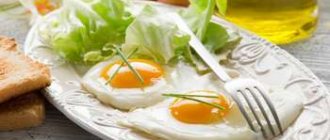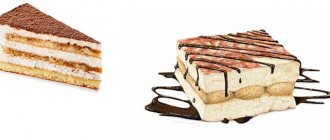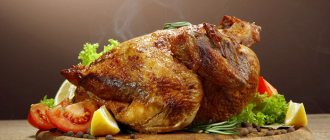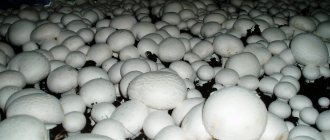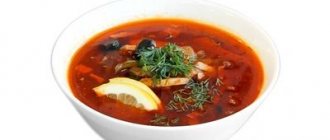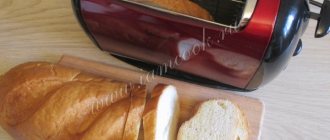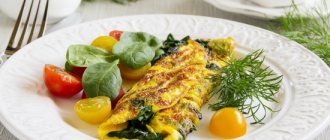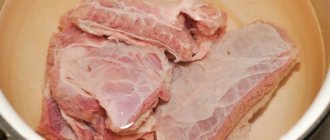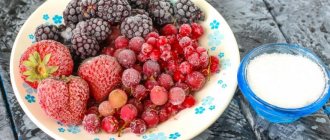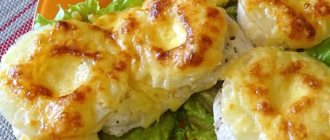Recipe Fried champignons with sour cream. Calorie, chemical composition and nutritional value.
Nutritional value and chemical composition of “Fried champignons with sour cream.”
The table shows the nutritional content (calories, proteins, fats, carbohydrates, vitamins and minerals) per 100 grams of edible portion.
| Nutrient | Quantity | Norm** | % of the norm in 100 g | % of the norm in 100 kcal | 100% normal |
| Calorie content | 91.5 kcal | 1684 kcal | 5.4% | 5.9% | 1840 |
| Squirrels | 3.1 g | 76 g | 4.1% | 4.5% | 2452 g |
| Fats | 7.4 g | 56 g | 13.2% | 14.4% | 757 g |
| Carbohydrates | 2.8 g | 219 g | 1.3% | 1.4% | 7821 g |
| Organic acids | 0.2 g | ~ | |||
| Alimentary fiber | 2.1 g | 20 g | 10.5% | 11.5% | 952 g |
| Water | 83.4 g | 2273 g | 3.7% | 4% | 2725 g |
| Ash | 0.875 g | ~ | |||
| Vitamins | |||||
| Vitamin A, RE | 31 mcg | 900 mcg | 3.4% | 3.7% | 2903 g |
| Retinol | 0.028 mg | ~ | |||
| beta carotene | 0.016 mg | 5 mg | 0.3% | 0.3% | 31250 g |
| Vitamin B1, thiamine | 0.071 mg | 1.5 mg | 4.7% | 5.1% | 2113 g |
| Vitamin B2, riboflavin | 0.26 mg | 1.8 mg | 14.4% | 15.7% | 692 g |
| Vitamin B4, choline | 23.25 mg | 500 mg | 4.7% | 5.1% | 2151 g |
| Vitamin B5, pantothenic | 1.176 mg | 5 mg | 23.5% | 25.7% | 425 g |
| Vitamin B6, pyridoxine | 0.07 mg | 2 mg | 3.5% | 3.8% | 2857 g |
| Vitamin B9, folates | 19.563 mcg | 400 mcg | 4.9% | 5.4% | 2045 g |
| Vitamin B12, cobalamin | 0.069 mcg | 3 mcg | 2.3% | 2.5% | 4348 g |
| Vitamin C, ascorbic acid | 6.31 mg | 90 mg | 7% | 7.7% | 1426 g |
| Vitamin D, calciferol | 0.019 mcg | 10 mcg | 0.2% | 0.2% | 52632 g |
| Vitamin E, alpha tocopherol, TE | 1.554 mg | 15 mg | 10.4% | 11.4% | 965 g |
| Vitamin H, biotin | 0.909 mcg | 50 mcg | 1.8% | 2% | 5501 g |
| Vitamin RR, NE | 3.1594 mg | 20 mg | 15.8% | 17.3% | 633 g |
| Niacin | 2.571 mg | ~ | |||
| Macronutrients | |||||
| Potassium, K | 342.05 mg | 2500 mg | 13.7% | 15% | 731 g |
| Calcium, Ca | 26.28 mg | 1000 mg | 2.6% | 2.8% | 3805 g |
| Magnesium, Mg | 12.96 mg | 400 mg | 3.2% | 3.5% | 3086 g |
| Sodium, Na | 10.73 mg | 1300 mg | 0.8% | 0.9% | 12116 g |
| Sera, S | 21.61 mg | 1000 mg | 2.2% | 2.4% | 4627 g |
| Phosphorus, P | 86.3 mg | 800 mg | 10.8% | 11.8% | 927 g |
| Chlorine, Cl | 19.53 mg | 2300 mg | 0.8% | 0.9% | 11777 g |
| Microelements | |||||
| Aluminium, Al | 104.2 mcg | ~ | |||
| Bor, B | 52.1 mcg | ~ | |||
| Iron, Fe | 0.402 mg | 18 mg | 2.2% | 2.4% | 4478 g |
| Yod, I | 10.16 mcg | 150 mcg | 6.8% | 7.4% | 1476 g |
| Cobalt, Co | 9.115 mcg | 10 mcg | 91.2% | 99.7% | 110 g |
| Manganese, Mn | 0.0599 mg | 2 mg | 3% | 3.3% | 3339 g |
| Copper, Cu | 23.44 mcg | 1000 mcg | 2.3% | 2.5% | 4266 g |
| Molybdenum, Mo | 1.563 mcg | 70 mcg | 2.2% | 2.4% | 4479 g |
| Nickel, Ni | 0.781 mcg | ~ | |||
| Rubidium, Rb | 137.5 mcg | ~ | |||
| Fluorine, F | 15.36 mcg | 4000 mcg | 0.4% | 0.4% | 26042 g |
| Chromium, Cr | 7.29 mcg | 50 mcg | 14.6% | 16% | 686 g |
| Zinc, Zn | 0.3672 mg | 12 mg | 3.1% | 3.4% | 3268 g |
| Digestible carbohydrates | |||||
| Starch and dextrins | 0.026 g | ~ | |||
| Mono- and disaccharides (sugars) | 2.8 g | max 100 g | |||
| Glucose (dextrose) | 0.339 g | ~ | |||
| Sucrose | 1.693 g | ~ | |||
| Fructose | 0.313 g | ~ | |||
| Essential amino acids | 0.074 g | ~ | |||
| Arginine* | 0.042 g | ~ | |||
| Valin | 0.007 g | ~ | |||
| Histidine* | 0.004 g | ~ | |||
| Isoleucine | 0.01 g | ~ | |||
| Leucine | 0.013 g | ~ | |||
| Lysine | 0.016 g | ~ | |||
| Methionine | 0.003 g | ~ | |||
| Methionine + Cysteine | 0.005 g | ~ | |||
| Threonine | 0.01 g | ~ | |||
| Tryptophan | 0.005 g | ~ | |||
| Phenylalanine | 0.011 g | ~ | |||
| Phenylalanine+Tyrosine | 0.018 g | ~ | |||
| Nonessential amino acids | 0.173 g | ~ | |||
| Alanin | 0.015 g | ~ | |||
| Aspartic acid | 0.018 g | ~ | |||
| Glycine | 0.011 g | ~ | |||
| Glutamic acid | 0.057 g | ~ | |||
| Proline | 0.008 g | ~ | |||
| Serin | 0.007 g | ~ | |||
| Tyrosine | 0.008 g | ~ | |||
| Cysteine | 0.003 g | ~ | |||
| Sterols (sterols) | |||||
| Cholesterol | 16.31 mg | max 300 mg | |||
| beta sitosterol | 6.25 mg | ~ | |||
| Saturated fatty acids | |||||
| Saturated fatty acids | 2.7 g | max 18.7 g | |||
| 10:0 Kaprinovaya | 0.001 g | ~ | |||
| 14:0 Miristinovaya | 0.017 g | ~ | |||
| 16:0 Palmitinaya | 0.224 g | ~ | |||
| 18:0 Stearic | 0.132 g | ~ | |||
| 20:0 Arakhinovaya | 0.009 g | ~ | |||
| 22:0 Begenovaya | 0.022 g | ~ | |||
| Monounsaturated fatty acids | 0.82 g | min 16.8 g | 4.9% | 5.4% | |
| 16:1 Palmitoleic | 0.038 g | ~ | |||
| 18:1 Oleic (omega-9) | 0.76 g | ~ | |||
| Polyunsaturated fatty acids | 2.124 g | from 11.2 to 20.6 g | 19% | 20.8% | |
| 18:2 Linolevaya | 2.124 g | ~ | |||
| Omega-6 fatty acids | 0.3 g | from 4.7 to 16.8 g | 6.4% | 7% |
Recipe: Champignons in sour cream. Calorie, chemical composition and nutritional value.
Nutritional value and chemical composition of “Champignons in sour cream.”
The table shows the nutritional content (calories, proteins, fats, carbohydrates, vitamins and minerals) per 100 grams of edible portion.
| Nutrient | Quantity | Norm** | % of the norm in 100 g | % of the norm in 100 kcal | 100% normal |
| Calorie content | 95.5 kcal | 1684 kcal | 5.7% | 6% | 1763 |
| Squirrels | 3.3 g | 76 g | 4.3% | 4.5% | 2303 g |
| Fats | 8.1 g | 56 g | 14.5% | 15.2% | 691 g |
| Carbohydrates | 2.1 g | 219 g | 1% | 1% | 10429 g |
| Organic acids | 0.2 g | ~ | |||
| Alimentary fiber | 2.1 g | 20 g | 10.5% | 11% | 952 g |
| Water | 83.3 g | 2273 g | 3.7% | 3.9% | 2729 g |
| Ash | 0.874 g | ~ | |||
| Vitamins | |||||
| Vitamin A, RE | 28.7 mcg | 900 mcg | 3.2% | 3.4% | 3136 g |
| Retinol | 0.026 mg | ~ | |||
| beta carotene | 0.017 mg | 5 mg | 0.3% | 0.3% | 29412 g |
| Vitamin B1, thiamine | 0.075 mg | 1.5 mg | 5% | 5.2% | 2000 g |
| Vitamin B2, riboflavin | 0.295 mg | 1.8 mg | 16.4% | 17.2% | 610 g |
| Vitamin B4, choline | 22.68 mg | 500 mg | 4.5% | 4.7% | 2205 g |
| Vitamin B5, pantothenic | 1.342 mg | 5 mg | 26.8% | 28.1% | 373 g |
| Vitamin B6, pyridoxine | 0.062 mg | 2 mg | 3.1% | 3.2% | 3226 g |
| Vitamin B9, folates | 21.106 mcg | 400 mcg | 5.3% | 5.5% | 1895 |
| Vitamin B12, cobalamin | 0.138 mcg | 3 mcg | 4.6% | 4.8% | 2174 g |
| Vitamin C, ascorbic acid | 6.11 mg | 90 mg | 6.8% | 7.1% | 1473 g |
| Vitamin D, calciferol | 0.078 mcg | 10 mcg | 0.8% | 0.8% | 12821 g |
| Vitamin E, alpha tocopherol, TE | 0.166 mg | 15 mg | 1.1% | 1.2% | 9036 g |
| Vitamin H, biotin | 10.547 mcg | 50 mcg | 21.1% | 22.1% | 474 g |
| Vitamin K, phylloquinone | 0.3 mcg | 120 mcg | 0.3% | 0.3% | 40000 g |
| Vitamin RR, NE | 3.5879 mg | 20 mg | 17.9% | 18.7% | 557 g |
| Niacin | 2.963 mg | ~ | |||
| Macronutrients | |||||
| Potassium, K | 371.75 mg | 2500 mg | 14.9% | 15.6% | 672 g |
| Calcium, Ca | 22.83 mg | 1000 mg | 2.3% | 2.4% | 4380 g |
| Silicon, Si | 2.727 mg | 30 mg | 9.1% | 9.5% | 1100 g |
| Magnesium, Mg | 13.01 mg | 400 mg | 3.3% | 3.5% | 3075 g |
| Sodium, Na | 10.37 mg | 1300 mg | 0.8% | 0.8% | 12536 g |
| Sera, S | 31.26 mg | 1000 mg | 3.1% | 3.2% | 3199 g |
| Phosphorus, P | 90.5 mg | 800 mg | 11.3% | 11.8% | 884 g |
| Chlorine, Cl | 32.06 mg | 2300 mg | 1.4% | 1.5% | 7174 g |
| Microelements | |||||
| Aluminium, Al | 335.2 mcg | ~ | |||
| Bor, B | 36.4 mcg | ~ | |||
| Vanadium, V | 1.21 mcg | ~ | |||
| Iron, Fe | 0.362 mg | 18 mg | 2% | 2.1% | 4972 g |
| Yod, I | 13 mcg | 150 mcg | 8.7% | 9.1% | 1154 g |
| Cobalt, Co | 10.052 mcg | 10 mcg | 100.5% | 105.2% | 99 g |
| Lithium, Li | 0.485 mcg | ~ | |||
| Manganese, Mn | 0.1284 mg | 2 mg | 6.4% | 6.7% | 1558 g |
| Copper, Cu | 322.09 mcg | 1000 mcg | 32.2% | 33.7% | 310 g |
| Molybdenum, Mo | 2.677 mcg | 70 mcg | 3.8% | 4% | 2615 g |
| Nickel, Ni | 0.545 mcg | ~ | |||
| Tin, Sn | 2.23 mcg | ~ | |||
| Rubidium, Rb | 102.3 mcg | ~ | |||
| Selenium, Se | 15.917 mcg | 55 mcg | 28.9% | 30.3% | 346 g |
| Strontium, Sr | 13.1 mcg | ~ | |||
| Titanium, Ti | 34.85 mcg | ~ | |||
| Fluorine, F | 17.04 mcg | 4000 mcg | 0.4% | 0.4% | 23474 g |
| Chromium, Cr | 8.59 mcg | 50 mcg | 17.2% | 18% | 582 g |
| Zinc, Zn | 0.3689 mg | 12 mg | 3.1% | 3.2% | 3253 g |
| Digestible carbohydrates | |||||
| Starch and dextrins | 0.018 g | ~ | |||
| Mono- and disaccharides (sugars) | 2.1 g | max 100 g | |||
| Glucose (dextrose) | 0.236 g | ~ | |||
| Sucrose | 1.182 g | ~ | |||
| Fructose | 0.218 g | ~ | |||
| Essential amino acids | 0.052 g | ~ | |||
| Arginine* | 0.029 g | ~ | |||
| Valin | 0.005 g | ~ | |||
| Histidine* | 0.003 g | ~ | |||
| Isoleucine | 0.007 g | ~ | |||
| Leucine | 0.009 g | ~ | |||
| Lysine | 0.011 g | ~ | |||
| Methionine | 0.002 g | ~ | |||
| Methionine + Cysteine | 0.004 g | ~ | |||
| Threonine | 0.007 g | ~ | |||
| Tryptophan | 0.004 g | ~ | |||
| Phenylalanine | 0.007 g | ~ | |||
| Phenylalanine+Tyrosine | 0.013 g | ~ | |||
| Nonessential amino acids | 0.121 g | ~ | |||
| Alanin | 0.011 g | ~ | |||
| Aspartic acid | 0.013 g | ~ | |||
| Glycine | 0.007 g | ~ | |||
| Glutamic acid | 0.04 g | ~ | |||
| Proline | 0.005 g | ~ | |||
| Serin | 0.005 g | ~ | |||
| Tyrosine | 0.005 g | ~ | |||
| Cysteine | 0.002 g | ~ | |||
| Sterols (sterols) | |||||
| Cholesterol | 14.94 mg | max 300 mg | |||
| Saturated fatty acids | |||||
| Saturated fatty acids | 2.1 g | max 18.7 g | |||
| 10:0 Kaprinovaya | 0.001 g | ~ | |||
| 14:0 Miristinovaya | 0.02 g | ~ | |||
| 16:0 Palmitinaya | 0.036 g | ~ | |||
| 18:0 Stearic | 0.005 g | ~ | |||
| Monounsaturated fatty acids | 1.131 g | min 16.8 g | 6.7% | 7% | |
| 16:1 Palmitoleic | 0.044 g | ~ | |||
| 18:1 Oleic (omega-9) | 0.022 g | ~ | |||
| Polyunsaturated fatty acids | 0.457 g | from 11.2 to 20.6 g | 4.1% | 4.3% | |
| 18:2 Linolevaya | 0.298 g | ~ | |||
| Omega-6 fatty acids | 0.4 g | from 4.7 to 16.8 g | 8.5% | 8.9% |
The energy value of champignons in sour cream is 95.5 kcal.
Primary Source: Created in the application by the user. Read more.
** This table shows the average levels of vitamins and minerals for an adult. If you want to know the norms taking into account your gender, age and other factors, then use the “My Healthy Diet” application.
Recipe Fried champignons with sour cream. Calorie, chemical composition and nutritional value.
Fried champignons with sour cream are rich in vitamins and minerals such as: vitamin B2 - 26.5%, vitamin B5 - 44.6%, vitamin C - 11.1%, vitamin E - 26.1%, vitamin H - 36%, vitamin PP - 28.8%, potassium - 23.4%, silicon - 15%, phosphorus - 17.3%, iodine - 14.9%, cobalt - 165.6%, copper - 54.1%, selenium - 54.9%, chromium - 17.2%
- Vitamin B2 is involved in redox reactions, helps to increase the color sensitivity of the visual analyzer and dark adaptation. Insufficient intake of vitamin B2 is accompanied by impaired condition of the skin, mucous membranes, and impaired light and twilight vision.
- Vitamin B5 is involved in protein, fat, carbohydrate metabolism, cholesterol metabolism, the synthesis of a number of hormones, hemoglobin, promotes the absorption of amino acids and sugars in the intestines, and supports the function of the adrenal cortex. A lack of pantothenic acid can lead to damage to the skin and mucous membranes.
- Vitamin C is involved in redox reactions, the functioning of the immune system, and promotes the absorption of iron. Deficiency leads to loose and bleeding gums, nosebleeds due to increased permeability and fragility of blood capillaries.
- Vitamin E has antioxidant properties, is necessary for the functioning of the gonads and heart muscle, and is a universal stabilizer of cell membranes. With vitamin E deficiency, hemolysis of erythrocytes and neurological disorders are observed.
- Vitamin H is involved in the synthesis of fats, glycogen, and amino acid metabolism. Insufficient consumption of this vitamin can lead to disruption of the normal condition of the skin.
- Vitamin PP is involved in redox reactions of energy metabolism. Insufficient vitamin intake is accompanied by disruption of the normal condition of the skin, gastrointestinal tract and nervous system.
- Potassium is the main intracellular ion that takes part in the regulation of water, acid and electrolyte balance, and is involved in the processes of conducting nerve impulses and regulating blood pressure.
- Silicon is included as a structural component in glycosaminoglycans and stimulates collagen synthesis.
- Phosphorus takes part in many physiological processes, including energy metabolism, regulates acid-base balance, is part of phospholipids, nucleotides and nucleic acids, and is necessary for the mineralization of bones and teeth. Deficiency leads to anorexia, anemia, and rickets.
- Iodine is involved in the functioning of the thyroid gland, ensuring the formation of hormones (thyroxine and triiodothyronine). Necessary for the growth and differentiation of cells of all tissues of the human body, mitochondrial respiration, regulation of transmembrane transport of sodium and hormones. Insufficient intake leads to endemic goiter with hypothyroidism and slowing of metabolism, arterial hypotension, stunted growth and mental development in children.
- Cobalt is part of vitamin B12. Activates enzymes of fatty acid metabolism and folic acid metabolism.
- Copper is part of enzymes that have redox activity and are involved in the metabolism of iron, stimulates the absorption of proteins and carbohydrates. Participates in the processes of providing oxygen to the tissues of the human body. Deficiency is manifested by disturbances in the formation of the cardiovascular system and skeleton, and the development of connective tissue dysplasia.
- Selenium is an essential element of the antioxidant defense system of the human body, has an immunomodulatory effect, and is involved in the regulation of the action of thyroid hormones. Deficiency leads to Kashin-Beck disease (osteoarthritis with multiple deformities of the joints, spine and limbs), Keshan disease (endemic myocardiopathy), and hereditary thrombasthenia.
- Chromium is involved in the regulation of blood glucose levels, enhancing the effect of insulin. Deficiency leads to decreased glucose tolerance.
Recipe Fried champignons with sour cream. Calorie, chemical composition and nutritional value.
Fried champignons with sour cream are rich in vitamins and minerals such as: vitamin B2 - 27.5%, vitamin B5 - 45.4%, vitamin H - 37.1%, vitamin PP - 28.3%, potassium - 20.7% , phosphorus - 15.2%, iodine - 14.9%, cobalt - 140.2%, copper - 50.5%, selenium - 55.1%, chromium - 15.1%
- Vitamin B2 is involved in redox reactions, helps to increase the color sensitivity of the visual analyzer and dark adaptation. Insufficient intake of vitamin B2 is accompanied by impaired condition of the skin, mucous membranes, and impaired light and twilight vision.
- Vitamin B5 is involved in protein, fat, carbohydrate metabolism, cholesterol metabolism, the synthesis of a number of hormones, hemoglobin, promotes the absorption of amino acids and sugars in the intestines, and supports the function of the adrenal cortex. A lack of pantothenic acid can lead to damage to the skin and mucous membranes.
- Vitamin H is involved in the synthesis of fats, glycogen, and amino acid metabolism. Insufficient consumption of this vitamin can lead to disruption of the normal condition of the skin.
- Vitamin PP is involved in redox reactions of energy metabolism. Insufficient vitamin intake is accompanied by disruption of the normal condition of the skin, gastrointestinal tract and nervous system.
- Potassium is the main intracellular ion that takes part in the regulation of water, acid and electrolyte balance, and is involved in the processes of conducting nerve impulses and regulating blood pressure.
- Phosphorus takes part in many physiological processes, including energy metabolism, regulates acid-base balance, is part of phospholipids, nucleotides and nucleic acids, and is necessary for the mineralization of bones and teeth. Deficiency leads to anorexia, anemia, and rickets.
- Iodine is involved in the functioning of the thyroid gland, ensuring the formation of hormones (thyroxine and triiodothyronine). Necessary for the growth and differentiation of cells of all tissues of the human body, mitochondrial respiration, regulation of transmembrane transport of sodium and hormones. Insufficient intake leads to endemic goiter with hypothyroidism and slowing of metabolism, arterial hypotension, stunted growth and mental development in children.
- Cobalt is part of vitamin B12. Activates enzymes of fatty acid metabolism and folic acid metabolism.
- Copper is part of enzymes that have redox activity and are involved in the metabolism of iron, stimulates the absorption of proteins and carbohydrates. Participates in the processes of providing oxygen to the tissues of the human body. Deficiency is manifested by disturbances in the formation of the cardiovascular system and skeleton, and the development of connective tissue dysplasia.
- Selenium is an essential element of the antioxidant defense system of the human body, has an immunomodulatory effect, and is involved in the regulation of the action of thyroid hormones. Deficiency leads to Kashin-Beck disease (osteoarthritis with multiple deformities of the joints, spine and limbs), Keshan disease (endemic myocardiopathy), and hereditary thrombasthenia.
- Chromium is involved in the regulation of blood glucose levels, enhancing the effect of insulin. Deficiency leads to decreased glucose tolerance.
Recipe: Mushrooms fried in sour cream. Calorie, chemical composition and nutritional value.
Nutritional value and chemical composition of “Mushrooms fried in sour cream.”
The table shows the nutritional content (calories, proteins, fats, carbohydrates, vitamins and minerals) per 100 grams of edible portion.
| Nutrient | Quantity | Norm** | % of the norm in 100 g | % of the norm in 100 kcal | 100% normal |
| Calorie content | 101.7 kcal | 1684 kcal | 6% | 5.9% | 1656 g |
| Squirrels | 2.1 g | 76 g | 2.8% | 2.8% | 3619 g |
| Fats | 9.3 g | 56 g | 16.6% | 16.3% | 602 g |
| Carbohydrates | 3.2 g | 219 g | 1.5% | 1.5% | 6844 g |
| Organic acids | 0.2 g | ~ | |||
| Alimentary fiber | 1.8 g | 20 g | 9% | 8.8% | 1111 g |
| Water | 76.8 g | 2273 g | 3.4% | 3.3% | 2960 g |
| Ash | 0.596 g | ~ | |||
| Vitamins | |||||
| Vitamin A, RE | 30.5 mcg | 900 mcg | 3.4% | 3.3% | 2951 g |
| Retinol | 0.029 mg | ~ | |||
| beta carotene | 0.026 mg | 5 mg | 0.5% | 0.5% | 19231 g |
| Vitamin B1, thiamine | 0.03 mg | 1.5 mg | 2% | 2% | 5000 g |
| Vitamin B2, riboflavin | 0.132 mg | 1.8 mg | 7.3% | 7.2% | 1364 g |
| Vitamin B4, choline | 11.34 mg | 500 mg | 2.3% | 2.3% | 4409 g |
| Vitamin B5, pantothenic | 0.094 mg | 5 mg | 1.9% | 1.9% | 5319 g |
| Vitamin B6, pyridoxine | 0.146 mg | 2 mg | 7.3% | 7.2% | 1370 g |
| Vitamin B9, folates | 8.646 mcg | 400 mcg | 2.2% | 2.2% | 4626 g |
| Vitamin B12, cobalamin | 0.086 mcg | 3 mcg | 2.9% | 2.9% | 3488 g |
| Vitamin C, ascorbic acid | 3.48 mg | 90 mg | 3.9% | 3.8% | 2586 g |
| Vitamin D, calciferol | 0.019 mcg | 10 mcg | 0.2% | 0.2% | 52632 g |
| Vitamin E, alpha tocopherol, TE | 2.411 mg | 15 mg | 16.1% | 15.8% | 622 g |
| Vitamin H, biotin | 1.115 mcg | 50 mcg | 2.2% | 2.2% | 4484 g |
| Vitamin K, phylloquinone | 0.7 mcg | 120 mcg | 0.6% | 0.6% | 17143 g |
| Vitamin RR, NE | 0.2901 mg | 20 mg | 1.5% | 1.5% | 6894 g |
| Niacin | 0.089 mg | ~ | |||
| Macronutrients | |||||
| Potassium, K | 101.47 mg | 2500 mg | 4.1% | 4% | 2464 g |
| Calcium, Ca | 27.52 mg | 1000 mg | 2.8% | 2.8% | 3634 g |
| Silicon, Si | 1.636 mg | 30 mg | 5.5% | 5.4% | 1834 |
| Magnesium, Mg | 8.55 mg | 400 mg | 2.1% | 2.1% | 4678 g |
| Sodium, Na | 67.25 mg | 1300 mg | 5.2% | 5.1% | 1933 |
| Sera, S | 32.86 mg | 1000 mg | 3.3% | 3.2% | 3043 g |
| Phosphorus, P | 40.9 mg | 800 mg | 5.1% | 5% | 1956 |
| Chlorine, Cl | 112.54 mg | 2300 mg | 4.9% | 4.8% | 2044 g |
| Microelements | |||||
| Aluminium, Al | 197.7 mcg | ~ | |||
| Bor, B | 41.8 mcg | ~ | |||
| Vanadium, V | 0.14 mcg | ~ | |||
| Iron, Fe | 0.866 mg | 18 mg | 4.8% | 4.7% | 2079 g |
| Yod, I | 4.98 mcg | 150 mcg | 3.3% | 3.2% | 3012 g |
| Cobalt, Co | 2.066 mcg | 10 mcg | 20.7% | 20.4% | 484 g |
| Lithium, Li | 1.547 mcg | ~ | |||
| Manganese, Mn | 0.0613 mg | 2 mg | 3.1% | 3% | 3263 g |
| Copper, Cu | 681.03 mcg | 1000 mcg | 68.1% | 67% | 147 g |
| Molybdenum, Mo | 1.338 mcg | 70 mcg | 1.9% | 1.9% | 5232 g |
| Nickel, Ni | 2.454 mcg | ~ | |||
| Tin, Sn | 2.47 mcg | ~ | |||
| Rubidium, Rb | 163.2 mcg | ~ | |||
| Selenium, Se | 2.932 mcg | 55 mcg | 5.3% | 5.2% | 1876 |
| Strontium, Sr | 3.24 mcg | ~ | |||
| Fluorine, F | 9.65 mcg | 4000 mcg | 0.2% | 0.2% | 41451 g |
| Chromium, Cr | 2.31 mcg | 50 mcg | 4.6% | 4.5% | 2165 g |
| Zinc, Zn | 6.5679 mg | 12 mg | 54.7% | 53.8% | 183 g |
| Digestible carbohydrates | |||||
| Starch and dextrins | 0.037 g | ~ | |||
| Mono- and disaccharides (sugars) | 3.5 g | max 100 g | |||
| Glucose (dextrose) | 0.538 g | ~ | |||
| Sucrose | 2.69 g | ~ | |||
| Fructose | 0.497 g | ~ | |||
| Essential amino acids | 0.118 g | ~ | |||
| Arginine* | 0.066 g | ~ | |||
| Valin | 0.01 g | ~ | |||
| Histidine* | 0.006 g | ~ | |||
| Isoleucine | 0.017 g | ~ | |||
| Leucine | 0.021 g | ~ | |||
| Lysine | 0.025 g | ~ | |||
| Methionine | 0.004 g | ~ | |||
| Methionine + Cysteine | 0.008 g | ~ | |||
| Threonine | 0.017 g | ~ | |||
| Tryptophan | 0.008 g | ~ | |||
| Phenylalanine | 0.017 g | ~ | |||
| Phenylalanine+Tyrosine | 0.029 g | ~ | |||
| Nonessential amino acids | 0.274 g | ~ | |||
| Alanin | 0.024 g | ~ | |||
| Aspartic acid | 0.029 g | ~ | |||
| Glycine | 0.017 g | ~ | |||
| Glutamic acid | 0.091 g | ~ | |||
| Proline | 0.012 g | ~ | |||
| Serin | 0.011 g | ~ | |||
| Tyrosine | 0.012 g | ~ | |||
| Cysteine | 0.005 g | ~ | |||
| Sterols (sterols) | |||||
| Cholesterol | 16.56 mg | max 300 mg | |||
| beta sitosterol | 10.272 mg | ~ | |||
| Saturated fatty acids | |||||
| Saturated fatty acids | 2.9 g | max 18.7 g | |||
| 10:0 Kaprinovaya | 0.005 g | ~ | |||
| 14:0 Miristinovaya | 0.033 g | ~ | |||
| 16:0 Palmitinaya | 0.353 g | ~ | |||
| 18:0 Stearic | 0.217 g | ~ | |||
| 20:0 Arakhinovaya | 0.015 g | ~ | |||
| 22:0 Begenovaya | 0.036 g | ~ | |||
| Monounsaturated fatty acids | 2.436 g | min 16.8 g | 14.5% | 14.3% | |
| 16:1 Palmitoleic | 0.002 g | ~ | |||
| 18:1 Oleic (omega-9) | 1.259 g | ~ | |||
| Polyunsaturated fatty acids | 3.628 g | from 11.2 to 20.6 g | 32.4% | 31.9% | |
| 18:2 Linolevaya | 3.19 g | ~ | |||
| Omega-6 fatty acids | 3.3 g | from 4.7 to 16.8 g | 70.2% | 69% |
